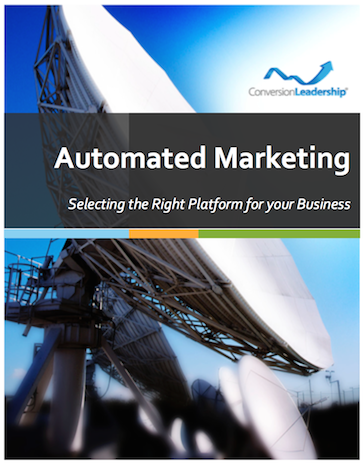Avoiding Marketing Automation Failure

Marketing automation can really improve productivity in your sales process, from making it easier to identify quality leads to compiling customer information from multiple sources.
All these benefits are pointless if your marketing automation project is doomed to failure from the start.
The causes of marketing automation failure are varied and range from not truly understanding your primary users' needs to mismanaging data migration from previous solutions.
Instead of sinking your IT and marketing budget into a black hole, follow these steps to avoid marketing automation failure.
Aligning to Business Processes
Whilst CRM vendors and service providers were usually blamed for the failures, technology wasn’t the main reason for CRM failures.
According to a report by Forrester Research, the most significant factor of CRM failure actually resides with problems with business processes (44% of respondents) followed closely by "people" (42%).
Your sales and marketing business processes and workflows should be assisted by marketing automation; not hindered by it.
If you choose a marketing automation platform because it has the biggest feature list or the vendor has provided a major adoption incentive, you can easily end up with a misalignment between your CRM and your existing business processes.
Certainly, slight adjustments to your workflow are common when incorporating a CRM. That's because there's always going to be a tradeoff between the challenge of changing your processes or the cost of changing the CRM platform's.
But, completely overhauling how your sales team handles the sales pipeline can, and often does, cause massive productivity problems.
Choosing the Right Technology
Understanding how your business processes and the marketing automation platform interact is a major step in choosing the right solution.
But, it's not the only one.
Other determining factors for choosing the right solution and avoiding marketing automation failure include whether you want a cloud-based or on-premise tool, if you need integration with your own custom apps or third-party solutions, whether the system scales for future business growth and how much support a vendor gives you post-sale.
These factors have a major impact in whether a particular marketing automation platform offers the right long-term solution for your company.
Change Management
Upgrading from an old CRM or bringing CRM into a company without any system in place will be a big change for users.
Their own specific tasks and processes will likely have to change from their routine and, almost certainly, their
productivity takes a hit while they learn to work with a new system.
Whether your sales rep have a real quota to meet, or are incentivised by commissions, major upheaval would be a big concern to them.
A change management plan should focus on encouraging user buy-in by explaining the practical benefits of the CRM and how its features make their workload more efficient.
They'll want to know what the CRM does for them on a day-to-day basis, so use the change management plan to get sales both familiar and excited about the new solution.
Also, don't assume they'll have the time to read manuals or online help. Effective training initiatives form an essential foundation in the change management plan and reduce downtime for the sales and marketing departments.
Migrating to the New System
Migrating from one system to another always carries a risk but in the cast of a CRM this can be a key contributor to marketing automation failure. Not least of which are the risks due to data migration.
Before moving all data to a new platform, remove outdated data, duplicated data and incomplete information.
There's no point in migrating data your sales and marketing department are never going to use. Also, removing bad data reduces the possibility that errors are introduced.
A marketing automation deployment has many moving parts, from the technical deployment to the human element.
To avoid a full, or even partial, marketing automation failure requires that you put in place a comprehensive plan before the solution is even purchased.
User buy-in and effective change management handles the human element while understanding what your company actually needs from a marketing automation platform helps mitigate risk and turns any potential marketing automation failure into a surefire success.


